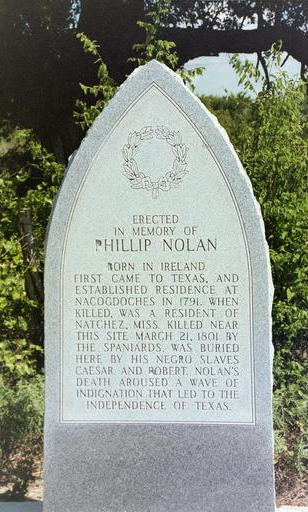Philip Nolan and Spanish Texas. (original) (raw)
A few generations ago, the name of Philip Nolan, who led one of the first Anglo intrusions into Spanish Texas, would have been familiar to every school child, but probably for the wrong reason: Edward Everett Hale's main character in The Man Without A Country was named Philip Nolan.
Hale used Nolan's name because it was well known, but the character in his novel shared little else with the real Philip Nolan. The fictional character condemned his country in a fit of pique and was condemned to spend the remainder of his life aboard a naval vessel and never again hear the words "United States of America." The real Philip Nolan helped his country expand in the Southwest.

Nolan came to Texas during the 1790s. He presented a plan to the Baron de Carondelet, governor of Louisiana, to travel to Texas to capture mustangs, or wild horses, and market them in Louisiana. The plan was approved. For a nation that still moved by horsepower, the likelihood of success for the venture was great.
Nolan and his employees made several trips to Texas, but Spanish officials, who had informants in New Orleans, became suspicious of him. They thought Nolan spent entirely too much time with General James Wilkinson, commander of United States forces along the frontier with Spain. Spanish authorities noted that in addition to capturing mustangs, in Texas, Nolan also spent a great deal of time exploring and making maps. Combining what was known of these activities and his closeness to Wilkinson, Governor Juan Bautista de Elguezabal, ordered Nolan's arrest in 1800.
Nolan returned to Texas on another expedition and was killed in a fight with Spanish soldiers near present Waco, Texas. The men accompanying Nolan were captured and led first to Nacogdoches, where they were held briefly in the Stone House, or Old Stone Fort, erected by the town's founder, Antonio Gil Y'Barbo, in 1779. Despite the distance, it was the only Spanish outpost in East Texas.
The men then were marched to Mexico, and there condemned for violations of Spanish law. Their punishment called for one prisoner to be executed and the other eight to serve ten years at hard labor. The men threw dice, with the lowest number judged the loser, which was poor Ephraim Blackburn. One of Nolan's men, Peter Ellis Bean, was a true survivor. Bean literally talked his way out of prison. He convinced authorities to release him so he could help them suppress a revolt; defected, and then convinced the revolutionaries to send him to New Orleans for supplies.
As for Nolan, we can credit him and men like him with "making news" in the United States that quickened the interest of other Americans about building futures in Texas.
July, 2003 column
A syndicated column in over 40 East Texas newspapers
Copyright Archie P. McDonald
This column is provided as a public service by the East Texas Historical Association. Archie P. McDonald is director of the Association and author of more than 20 books on Texas.